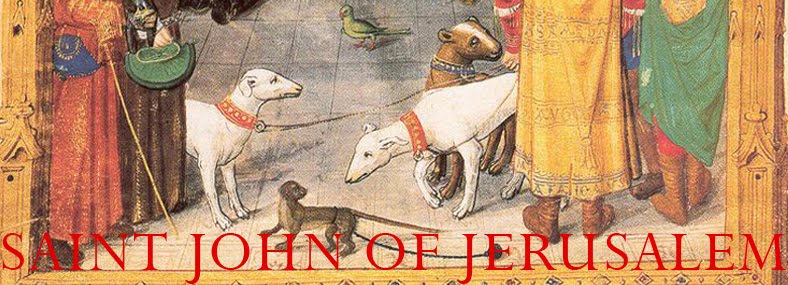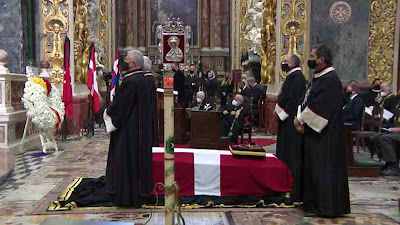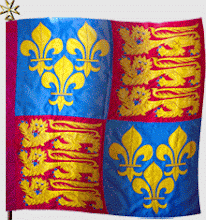A solemn Requiem Mass was held for our late brother Fra' Matthew Festing, 79th Prince and Grand Master of our Order, at the Church of the Assumption and Saint Gregory, Warwick Street; we are very grateful to Father Elliott-Smith, Rector, for his hospitality. The celebrant and preacher was Father Ronald Creighton-Jobe of the London Oratory, who has probably known Fra' Matthew longer now that most other members of the Order; he was assisted by Fathers Gerard Skinner and Gary Dench. We are grateful to a young member for the transcript of the homily, printed below. The music was provided by the choir of the Assumption, under the direction of Keith Brown.
The Mass may be watched in the video below.
+ In the name of the Father, and of the Son, and of the Holy Spirit. Amen.
Many of you were at Mass when Fra’ Richard [Berkley-Matthews] made his Solemn Vows and it was a very joyful occasion. And in a sense, I want to suggest to you that we are also here for a joyful occasion, praying for the repose of the soul of Fra’ Matthew and now of [his elder brother] Michael. But first we rejoice that Almighty God called him to Himself at the right time. It is always the right time when God calls us. But somehow it was particularly suitable. The last time I saw him, just before he went to Malta, he was surrounded by the young of the Order, and Matthew came alive – he always found the young very touching. He said, “I am going to Malta. After all, I tried to promote as best I could the Professed and now the Solemn Professions have been freed, I am going.” I said, “is that wise”, and he said, “Probably not”.
Well in the end it probably was wise, in God’s sight, because there he was, amongst his own, in that very remarkable church, Matthew just after was taken to hospital, died, and is buried in the crypt of the Grand Masters. And let us not forget that he was the 79th Grand Master.
As we look back on his life, he would be the first who wouldn’t want us to spend the time talking about it. But like many priests, when someone says that, inevitable one does talk about it because it is right and proper in order to encourage us to the virtues that he practised.
I remember Fra’ Matthew when he was made not the first Grand Prior but the restored Grand Prior after all those centuries, and he said to me afterwards, “What on earth do I do as Grand Prior?” I said, “You do your best”, and he did. And then after the funeral of Fra’ Andrew, and we were having a welcome drink in the Plaza Hotel, I said to him, “You do realise, that it is possible that you will be elected Grand Master”. He said, “Don’t be so stupid!”. And he was. And again, he said, “Now what do I do?”. “Do what you have always done: do your best,” and he did. Within his limitations (and we all have limitations), he tried to serve God, to love Him. He had a deep devotion to Our Lady, and he tried to help our Lords the Poor and the Sick.
He was very good with the Poor and the Sick, with sometime rather unusual consequences. I remember him going to visit Our Lords the Poor at the Termini Station in Rome. He didn’t look too well-off himself, and one of the Poor said, “That poor old thing there, they ought to do something for him.” Matthew liked that very much.
The other thing I remember (sorry about the anecdotes), is that when he was first elected, he came to Cortona in Tuscany where I was staying with friends. He had never been there. If you have ever been there, it is all up and down with hills, and he wasn’t best pleased about it (you will all recall a certain… linguistic tendency that Matthew could have). When we arrived at the celebration which was about the importance of the Order in Cortona (there were two Grand Masters) we were together, and our host in Cortona had his jacket and tie on, and Matthew didn’t, of course. When we arrived at the reception, they assumed it wasn’t Matthew who was the Grand Master, but our host. And he liked that too. Because humility has to be genuine, and it has to be heartfelt, and lived with a certain joy. Matthew had it.
I can’t say (and he would certainly not have said) that he always felt joyful in Rome for various reasons. Let’s say, Rome was a little too complicated for him, so he would escape from time to time. His attempts to learn Italian were not vastly successful either, but caused a certain amount of joy and merriment amongst the Italians because unlike the French (we shouldn’t say this), the Italians don’t mind you making a hash of their language. But all the time he did his best in circumstances and in a context in which he was never entirely at home. We know where he was at home: he was at home in Northumberland, and he was also very at home in Lourdes. He loved Our Lady and there he could help the Sick in a very practical way. As you know, he off-loaded them at the station for many years, and he continued to do that when he was Grand Master. Again, the Sick didn’t have the slightest idea who he was. As he got weaker physically, he still insisted on going [to Lourdes]. Again, he overheard someone say, “O look at that poor old thing, why don’t they do something for him.”
Well, God did something for him: He gave him a great possibility to exercise patience and forbearance, under extremely difficult circumstances. And he did it, with obedience and with determination to try to do God’s will. And that’s all that any of us can ask for: to try to do God’s will. And so frankly we don’t have to mourn.
We do mourn his physical presence (and there was a lot of it). We also mourn his capacity for affection: like many Northerners, he didn’t know quite how to express it sometimes, but he was a deeply affectionate man and loved his friends, and depended on their prayers and friendship. And that is why he didn’t always realise the complexities with which he had to deal with in various circumstances, because he tended to think well of people.
We are very grateful to be here tonight to have this opportunity and he would have most of all appreciated our prayers for him, and to be surrounded by (what I am sure is true) a deep sense of affection.
It is sad too that we are mourning Michael, but again: a thoroughly good man. Rather different in temperament to Matthew in some ways, but with that straightforward love of our Blessed Lord and Our Lady which he always felt he had particularly inherited from his mother’s family, the Riddells.
So, dear Matthew, we pray for you. My instinct is that he won’t have very long (whatever that means in terms of eternity) in purgatory, because he suffered. He was not always well-treated. But, in the end, neither was Our Blessed Lord, and we follow the Crucified Saviour who makes sense of pain and sorrow and suffering.
And so we can say with heartfelt devotion: Eternal rest grant to him, O Lord, and let perpetual light shine upon him – may he rest in peace. Amen.





























